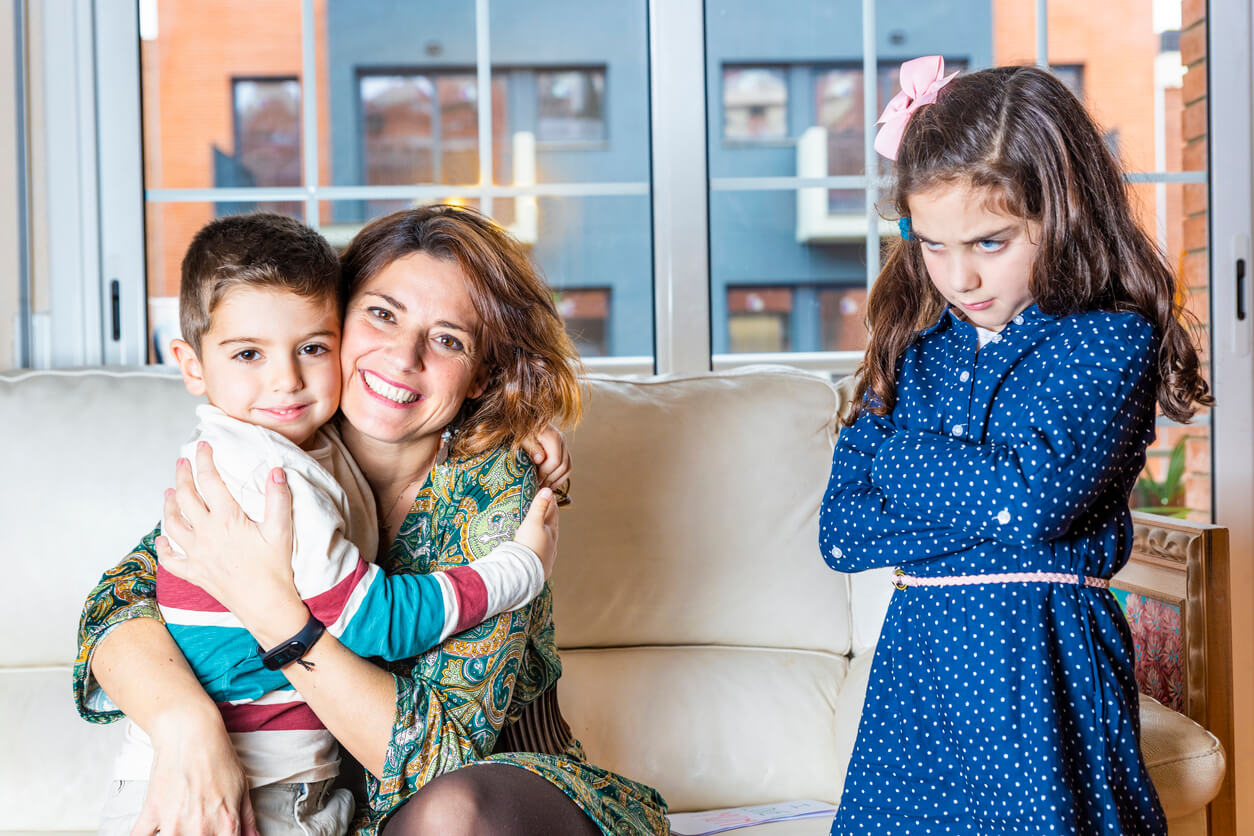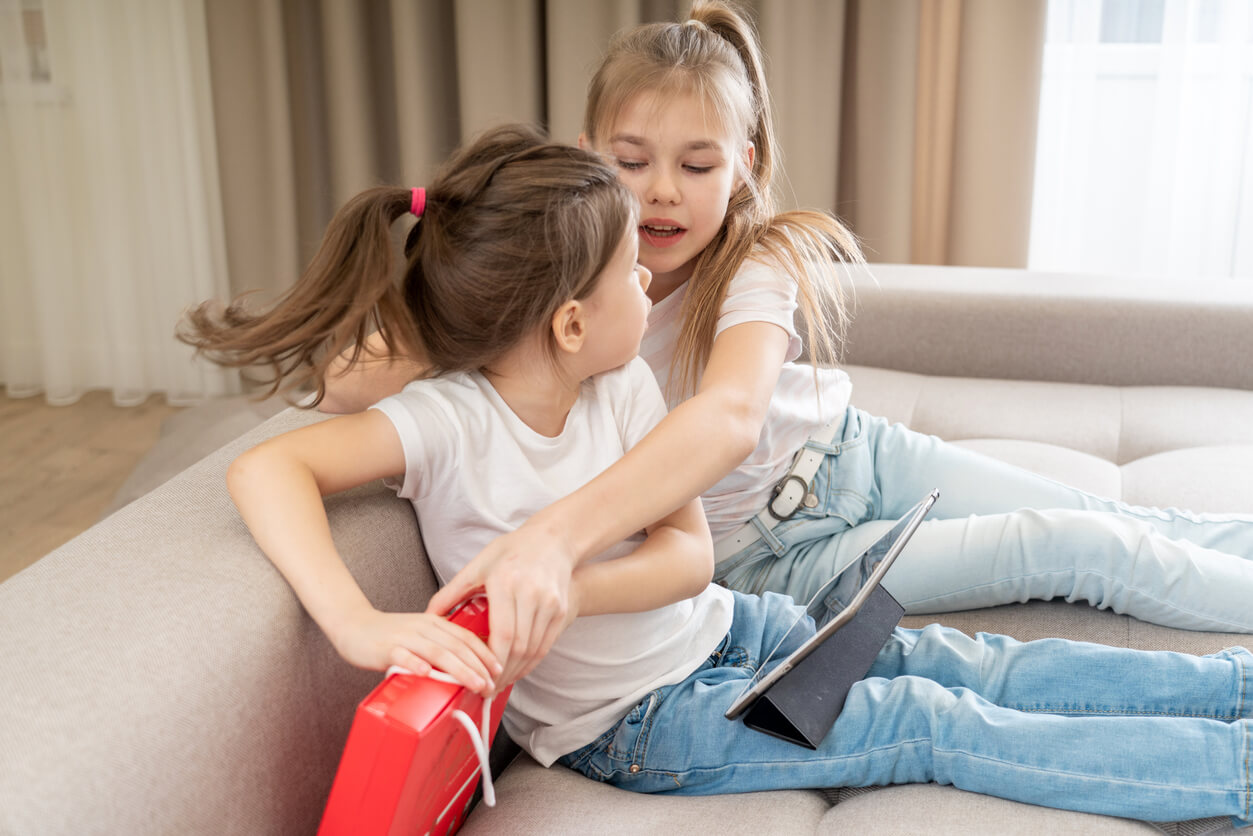Birthday Jealousy: How to Deal with this Situation Between Siblings?


Written and verified by the psychologist Elena Sanz Martín
When there’s more than one child at home, it’s common for certain rivalries to arise between them. Parents, with their parenting style, can help keep this envy and suspicion to a minimum. Just the same, there are situations that are particularly complicated to manage. This is the case with birthday jealousy, an emotion that causes sibling discomfort and can even tarnish the special day of the honoree.
Sibling jealousy is one of the biggest challenges for families with more than one child. Parents, uncles, aunts, uncles, grandparents, and other adults always do their best to make sure that none of the children feel excluded or unloved, so they try to be fair and equal.
Souvenirs for trips are bought in pairs and we even try to make sure they match to avoid arguments. At Christmas, we try to offer all children similar gifts in equal amounts. But what do we do when the birthday arrives, should we proceed in the same way? We’ll explore the answer below.
Birthday jealousy: How to handle it?
First of all, we must be aware that it’s normal for this situation to occur. The fact that one of your children is jealous of their sibling’s birthday shouldn’t worry you, nor should you take it as a sign that you’re raising them badly.
Even adults feel envious when we’re not the protagonists or when we see that someone has more than us. That’s why, if you don’t know where to start, we’ll offer you some keys that can help you in this regard.

Inform and anticipate
Knowing and understanding in advance what will happen won’t prevent children from feeling jealous, but it can help them to prepare themselves. Therefore, it can be a good idea to talk to siblings before the event. Explain to them that the birthday boy or girl will be having a party, will receive gifts, and will be the center of attention for the day. Also, remind them that they too will have a birthday and will enjoy the same privilege in due course, and warn them that they may feel jealousy and that this is natural.
Involve siblings in the preparations
Even if they’re not the stars of the day, siblings can be part of the birthday by getting involved in the preparations. Activities such as shopping for balloons and tablecloths, wrapping gifts, or creating a postcard for their sibling can make them feel more involved in the event.
This way, they won’t just be passive bystanders to the attention the birthday boy or girl receives. Instead, they’ll be part of the organization and will be able to experience the excitement of preparing everything to surprise and make a person they love happy. Asking for their collaboration for this purpose will make them feel important, valuable, and taken into account. In addition, it’ll help them learn to rejoice and participate in the happiness of others.
Don’t offer gifts to all children
To avoid conflicts and anger, many families choose to buy gifts not only for the birthday boy or girl but also for their siblings. In some cases, these gifts are similar in size, value, and importance, which is unfair, as it’s only one child’s birthday and it detracts from their prominence.
In other cases, siblings are offered a gift of lesser value, which, paradoxically, can make them feel inferior and increase the feeling of injustice. Receiving a coloring book while your sibling receives a bicycle doesn’t really help to alleviate the discomfort of jealousy.
The best option is to give presents to the birthday boy or girl alone. In the end, children need to learn to tolerate frustration, as this is just one of many similar occasions they’ll face in their lives. Therefore, if we avoid this discomfort, we’re not teaching them tools for the future.

Validating the emotion
However, not preventing discomfort doesn’t imply being indifferent to their suffering. In fact, jealousy over a sibling’s birthday can be a very unpleasant emotion for children. That’s why they need their reference figures to accompany them at this time.
Therefore, it’s important to help them recognize what they feel, allow them to express it, and reassure them that their feelings are natural and valid. To do this, it’s crucial to sit down with the child and talk about it. The idea is to accompany them in their feelings and help them to regulate them appropriately.
This type of parental action, which takes into account the child and their needs, helps to forge a secure attachment bond between the two. And, according to some research, this element greatly helps children feel less jealousy and know how to handle it in a better way.
Propose proactive solutions
Finally, we can encourage children not to let themselves be carried away by jealousy and enjoy the day, even if the protagonist is their sibling. Even if they’re not the center of attention, they can enjoy the cake and candy, participate in the games, and have fun with friends and family.
Also, they can focus on seeing how excited their sibling is to enjoy the decorations and gifts they participated in. This way, they can feel that their efforts are rewarded. Finally, there are always several ways to deal with the same situation.
Birthday jealousy is a learning opportunity
Ultimately, it’s about looking at this event as an opportunity to teach children to tolerate frustration and manage unpleasant emotions. The conversations, the attitudes we encourage, and the tools we offer at this time will be useful to them not only now, but also later in life.
Therefore, you shouldn’t try to cover up your children’s emotions or force them to feel differently. Instead, you can accompany them in what they feel so that, progressively, they can do it on their own. This is the basis of conscious parenting.
When there’s more than one child at home, it’s common for certain rivalries to arise between them. Parents, with their parenting style, can help keep this envy and suspicion to a minimum. Just the same, there are situations that are particularly complicated to manage. This is the case with birthday jealousy, an emotion that causes sibling discomfort and can even tarnish the special day of the honoree.
Sibling jealousy is one of the biggest challenges for families with more than one child. Parents, uncles, aunts, uncles, grandparents, and other adults always do their best to make sure that none of the children feel excluded or unloved, so they try to be fair and equal.
Souvenirs for trips are bought in pairs and we even try to make sure they match to avoid arguments. At Christmas, we try to offer all children similar gifts in equal amounts. But what do we do when the birthday arrives, should we proceed in the same way? We’ll explore the answer below.
Birthday jealousy: How to handle it?
First of all, we must be aware that it’s normal for this situation to occur. The fact that one of your children is jealous of their sibling’s birthday shouldn’t worry you, nor should you take it as a sign that you’re raising them badly.
Even adults feel envious when we’re not the protagonists or when we see that someone has more than us. That’s why, if you don’t know where to start, we’ll offer you some keys that can help you in this regard.

Inform and anticipate
Knowing and understanding in advance what will happen won’t prevent children from feeling jealous, but it can help them to prepare themselves. Therefore, it can be a good idea to talk to siblings before the event. Explain to them that the birthday boy or girl will be having a party, will receive gifts, and will be the center of attention for the day. Also, remind them that they too will have a birthday and will enjoy the same privilege in due course, and warn them that they may feel jealousy and that this is natural.
Involve siblings in the preparations
Even if they’re not the stars of the day, siblings can be part of the birthday by getting involved in the preparations. Activities such as shopping for balloons and tablecloths, wrapping gifts, or creating a postcard for their sibling can make them feel more involved in the event.
This way, they won’t just be passive bystanders to the attention the birthday boy or girl receives. Instead, they’ll be part of the organization and will be able to experience the excitement of preparing everything to surprise and make a person they love happy. Asking for their collaboration for this purpose will make them feel important, valuable, and taken into account. In addition, it’ll help them learn to rejoice and participate in the happiness of others.
Don’t offer gifts to all children
To avoid conflicts and anger, many families choose to buy gifts not only for the birthday boy or girl but also for their siblings. In some cases, these gifts are similar in size, value, and importance, which is unfair, as it’s only one child’s birthday and it detracts from their prominence.
In other cases, siblings are offered a gift of lesser value, which, paradoxically, can make them feel inferior and increase the feeling of injustice. Receiving a coloring book while your sibling receives a bicycle doesn’t really help to alleviate the discomfort of jealousy.
The best option is to give presents to the birthday boy or girl alone. In the end, children need to learn to tolerate frustration, as this is just one of many similar occasions they’ll face in their lives. Therefore, if we avoid this discomfort, we’re not teaching them tools for the future.

Validating the emotion
However, not preventing discomfort doesn’t imply being indifferent to their suffering. In fact, jealousy over a sibling’s birthday can be a very unpleasant emotion for children. That’s why they need their reference figures to accompany them at this time.
Therefore, it’s important to help them recognize what they feel, allow them to express it, and reassure them that their feelings are natural and valid. To do this, it’s crucial to sit down with the child and talk about it. The idea is to accompany them in their feelings and help them to regulate them appropriately.
This type of parental action, which takes into account the child and their needs, helps to forge a secure attachment bond between the two. And, according to some research, this element greatly helps children feel less jealousy and know how to handle it in a better way.
Propose proactive solutions
Finally, we can encourage children not to let themselves be carried away by jealousy and enjoy the day, even if the protagonist is their sibling. Even if they’re not the center of attention, they can enjoy the cake and candy, participate in the games, and have fun with friends and family.
Also, they can focus on seeing how excited their sibling is to enjoy the decorations and gifts they participated in. This way, they can feel that their efforts are rewarded. Finally, there are always several ways to deal with the same situation.
Birthday jealousy is a learning opportunity
Ultimately, it’s about looking at this event as an opportunity to teach children to tolerate frustration and manage unpleasant emotions. The conversations, the attitudes we encourage, and the tools we offer at this time will be useful to them not only now, but also later in life.
Therefore, you shouldn’t try to cover up your children’s emotions or force them to feel differently. Instead, you can accompany them in what they feel so that, progressively, they can do it on their own. This is the basis of conscious parenting.
All cited sources were thoroughly reviewed by our team to ensure their quality, reliability, currency, and validity. The bibliography of this article was considered reliable and of academic or scientific accuracy.
- Murphy, T. P., McCurdy, K., Jehl, B., Rowan, M., & Larrimore, K. (2020). Jealousy behaviors in early childhood: Associations with attachment and temperament. International Journal of Behavioral Development, 44(3), 266-272.
- Volling, B. L., McElwain, N. L., & Miller, A. L. (2002). Emotion regulation in context: The jealousy complex between young siblings and its relations with child and family characteristics. Child development, 73(2), 581-600.
This text is provided for informational purposes only and does not replace consultation with a professional. If in doubt, consult your specialist.








